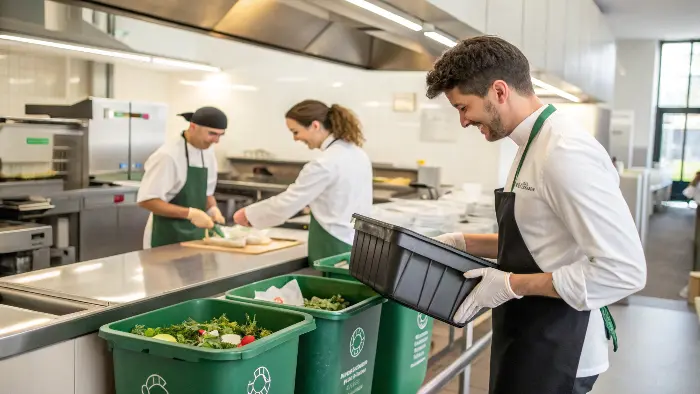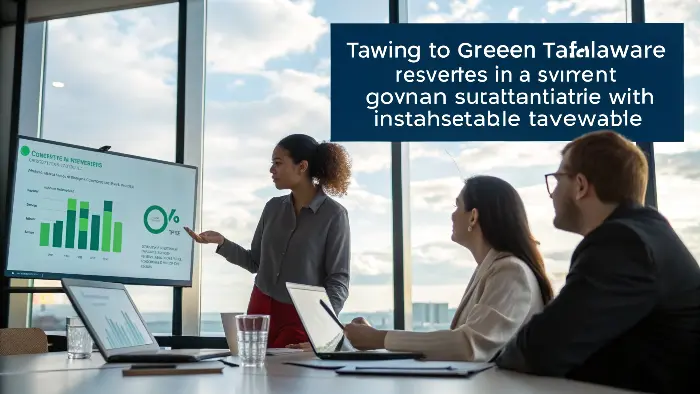Struggling with rising waste costs and eco-conscious customers? Traditional disposables are cheap upfront but costly long-term. Sustainable tableware offers a surprising, profitable alternative.
Yes, absolutely! Investing in sustainable tableware might seem like a bigger upfront cost, but it unlocks long-term savings, boosts your brand image, and can even open new revenue streams, making it a savvy choice for businesses aiming for both profit and planetary health.
Thinking about making the switch to eco-friendly options for your food service business can feel like a big step, especially when you’re watching the bottom line. I get it. Many of our partners, like Jacky, a packaging specialist in Canada, initially come to us with questions about the real cost versus the real benefit. They want to do the right thing for the planet, but it also has to make business sense. So, let’s break it down. You might be surprised at how a little green can lead to a lot more green in your bank account. Stick with me, and let’s explore this further.
Will Switching to Sustainable Tableware Actually Break My Budget?
Worried about the initial price tag of eco-tableware? It’s a common concern. But what if the long-term savings and benefits actually outweigh those first costs significantly?
Initially, sustainable tableware can have a higher per-unit cost. However, when you factor in reduced waste disposal fees, potential tax incentives, and increased customer loyalty, the overall financial picture often becomes much more attractive. It’s about looking at the total value, not just the price tag.
When I first started Ecosourcecn, I talked to so many business owners who were hesitant. They’d say, "Sure, I want to be green, but these PLA forks cost more than plastic!" And they’re not wrong, if you only look at the invoice for the forks themselves. But that’s like looking at only one piece of a giant puzzle. My friend Jacky, who sources packaging for a Canadian eco-conscious brand, always tells me he looks at the "total cost of ownership." It’s a smart way to think. Let’s dive deeper into this.
First, there’s the direct cost of goods. Yes, a compostable bagasse container might be a few cents more than a styrofoam one. But then, consider waste disposal. Many municipalities are increasing fees for landfill waste, especially for businesses. If your "waste" is now "compostable material," you might see those fees shrink or even disappear if you have a commercial composting partner. Some areas even offer tax breaks or incentives for businesses that adopt sustainable practices. We’ve seen clients effectively reduce their net costs this way.
Then there’s the intangible, but very real, financial impact. We’ll touch more on brand image later, but happy customers who choose you because you’re eco-friendly? That’s repeat business, and that’s gold. Think about it:
- Reduced Landfill Fees: This is often the most immediate saving.
- Potential for Composting Partnerships: Some services offer lower rates for clean, compostable materials.
- Bulk Purchasing Power: As demand grows, we at Ecosourcecn work hard to negotiate better prices for materials like PLA, bagasse, and FSC-certified paper, passing savings to you.
- Avoiding Future Fines: Regulations on single-use plastics are tightening. Investing now means avoiding potential penalties later. It’s not just about spending less now, it’s about saving more—and earning more—down the line. It’s a shift in perspective from short-term expense to long-term investment.
How Can Eco-Friendly Disposables Improve My Restaurant’s Reputation and Attract More Diners?
Customers increasingly care about sustainability. Are you missing out by sticking with old plastic? Eco-friendly choices can actually be a powerful magnet for attracting and keeping diners.
Using eco-friendly disposables visibly demonstrates your commitment to sustainability. This enhances your brand image, attracts environmentally conscious consumers, builds loyalty, and can be a powerful marketing tool, leading to increased foot traffic and positive word-of-mouth.

I remember a café owner I spoke to a couple of years ago. She was on the fence. After she switched to our compostable coffee cups and takeaway containers, she told me it was like a light switch flipped. Customers started commenting on it. "Oh, I love that you use these!" she’d hear. It became a talking point. People felt good about spending their money there. This isn’t just a feel-good story; it’s a business strategy.
Let’s get specific. In today’s world, especially with younger demographics like Millennials and Gen Z, sustainability isn’t just a "nice-to-have"; it’s often a deciding factor. Jacky, my Canadian contact, emphasizes this for his brand. They know their customers scrutinize packaging. - Enhanced Brand Perception: You’re not just a place that sells food; you’re a business that cares. This elevates your brand above competitors who haven’t made the switch. It says you’re responsible, modern, and forward-thinking.
- Attracting a Target Demographic: If your target audience values sustainability, then using eco-friendly tableware is a direct line to their hearts (and wallets!). They will actively seek out businesses that align with their values.
- Marketing Gold: You can—and should—shout about your eco-choices! Put it on your menu, your website, your social media. "We proudly use 100% compostable tableware!" It’s content that resonates. We’ve seen clients run successful campaigns just highlighting their switch.
- Increased Customer Loyalty: When customers feel good about their choices, they come back. They also tell their friends. Word-of-mouth marketing driven by genuine appreciation is incredibly powerful.
- Employee Pride: Don’t underestimate this! Employees often feel prouder working for a company that makes responsible choices. Happy staff means better service, which also leads to happy customers.
It’s a ripple effect. A simple choice in tableware can broadcast a powerful message about who you are as a business.What Are the Often Overlooked Operational Benefits of Using Compostable Tableware?
Think sustainable tableware is just about "being green"? There are surprising operational upsides too. From waste streams to staff morale, the benefits can streamline your daily grind.
Beyond environmental impact, compostable tableware can simplify waste management by creating a single stream for food and packaging, potentially reduce pest issues associated with food-soiled plastics, and even improve staff engagement by aligning with their values.

It’s easy to focus on the direct costs or the customer-facing benefits, but as someone who’s deep in the nitty-gritty of sustainable products with Ecosourcecn, I’ve seen how these choices can positively impact the back-of-house too. It’s not always the stuff you put on a billboard, but it makes a real difference to your day-to-day.
Jacky once mentioned to me that before his company fully committed to compostables, their waste sorting was a nightmare. Food scraps here, plastic there, "is this recyclable?" questions constantly. Switching made things simpler. - Simplified Waste Streams: Imagine if most of your food-soiled disposables could go into one bin – the compost bin. This can dramatically reduce the complexity of waste separation for your staff, meaning less time spent sorting and less contamination of recycling streams. If you’re using bagasse containers for oily food, the whole thing can often be composted together.
- Reduced Volume of Landfill Waste: Compostable materials, when properly composted, break down. Bulky plastics and styrofoam sit in landfills forever. Less landfill waste can mean fewer pick-ups or smaller, cheaper bins.
- Potential for Cleaner Operations: Food waste in plastic containers can get pretty gross and attract pests. While compostables still need proper handling, the idea of everything breaking down naturally can contribute to a (perceived or actual) cleaner waste process.
- Improved Staff Morale and Engagement: As I mentioned before, many employees, especially younger ones, genuinely care about sustainability. Working for a company that walks the talk can boost their morale and engagement. They’re not just serving food; they’re part of a positive change. This can even help with staff retention.
- Partnership Opportunities: Sometimes, local composting facilities or initiatives are looking for clean streams of compostable materials. This could lead to partnerships, better rates, or even positive PR for being a community player. We at Ecosourcecn often help connect our clients with such local resources where possible.
These operational benefits might not make headlines, but they contribute to a smoother, more efficient, and often more pleasant working environment. And that, indirectly, also impacts your bottom line.Is Investing in Green Tableware a Smart Move for My Business’s Future?
Wondering if sustainable tableware is just a trend or a true long-term strategy? Stricter regulations and shifting consumer demands suggest it’s key to future-proofing your business.
Absolutely. Investing in green tableware now positions your business ahead of upcoming plastic regulations, aligns with growing consumer demand for sustainability, and opens doors to innovation, making it a strategic move for long-term resilience and growth.

When I talk with businesses about making the switch, I always try to look beyond the immediate. Where is the industry heading? Where is consumer sentiment going? What will the regulatory landscape look like in 2, 5, or 10 years? Investing in sustainable tableware, like the PLA utensils or bagasse containers we offer at Ecosourcecn, isn’t just about today; it’s about being prepared and profitable tomorrow.
Think about it: - Regulatory Compliance: All over the world – North America, Europe, Asia, Australia – governments are cracking down on single-use plastics. Bans and restrictions are no longer a distant threat; they’re a current reality in many places. By switching now, you’re not just complying; you’re ahead of the curve, avoiding last-minute scrambles and potential fines. Jacky tells me staying ahead of Canadian regulations is a huge part of his job.
- Meeting Evolving Consumer Expectations: Today’s conscious consumer is tomorrow’s mainstream. The demand for businesses to be environmentally responsible is only going to grow. Those who adapt will thrive; those who don’t risk becoming obsolete.
- Innovation and Differentiation: The world of sustainable materials is constantly evolving. We’re seeing amazing new products made from agricultural byproducts, algae, and more. By embracing sustainability, you open your business to these innovations, allowing you to offer unique, appealing options that set you apart. This is where Ecosourcecn really shines, helping businesses access certified, high-quality, customizable green solutions.
- Risk Mitigation: Relying on traditional plastics means relying on fossil fuels, which have volatile prices and a questionable future. Diversifying into plant-based and renewable materials is a smart way to mitigate that supply chain risk.
- Attracting Talent and Investment: It’s not just customers who care. Employees, especially top talent, want to work for companies with strong values. Similarly, investors are increasingly looking at Environmental, Social, and Governance (ESG) factors. A commitment to sustainability can make your business more attractive on all fronts.
This isn’t just about being "eco-friendly." It’s about strategic foresight. It’s about building a resilient business that can adapt and flourish in a changing world. I truly believe that.Conclusion
Investing in sustainable tableware offers significant long-term financial gains, brand enhancement, and operational efficiencies, making it a smart, future-proof choice for any responsible business.


